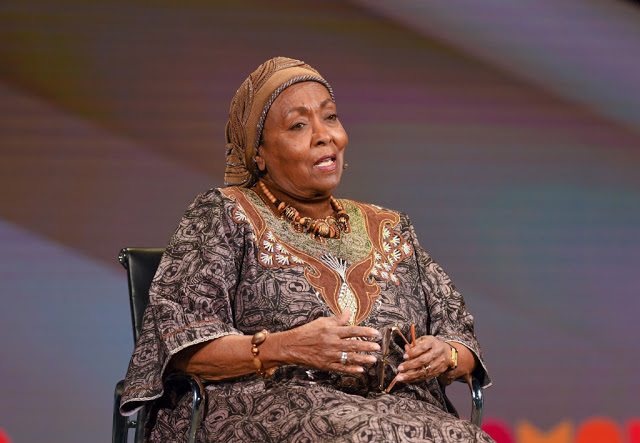
EDNA ADAN, FOUNDER AND DIRECTOR, EDNA ADAN HOSPITAL AND UNIVERSITY, AT THE 2019 WOMEN IN THE WORLD SUMMIT IN NEW YORK CITY, APRIL 11, 2019
Growing up in a rural village in Zimbabwe, Elizabeth Nyamayaro observed a disturbing dynamic.
“I saw women do all the hard work and men make all the important decisions. It was the men who decided whether the women should go and seek medical help. It was the men who decided how many children the family ought to have,” she said at the 10th annual Women in the World Summit on Thursday. She was among a fiery group of pioneers in women’s health who gathered to discuss how to change traditions that hold back women and girls.
When she left Africa, she realized that these problems are universal. “In most countries around the world, including here in the U.S., these challenges are so prominent. Reproductive health is a questionable thing that continues to be debated, without even taking account what the woman herself needs,” said Nyamayaro, who is senior adviser to the undersecretary-general and executive director of UN Women.
But how do you change deeply rooted traditions?
Edna Adan Ismail, the founder of a trailblazing maternity hospital in Somaliland, offered crucial insight, saying it starts with using language that resonates with the people you want to reach. For example, she said, some cultures believe that female genital mutilation protects girls from rape. The practice is so ingrained, it’s difficult to rewire people’s thinking, let alone introduce the topic. “You’re talking about genitals, private parts of a woman you don’t normally talk about,” she said, noting that those words are taboo.
“We understand the rights of women to their own body, but my grandmother wouldn’t understand that,” she continued. “When I talk about bleeding, when I talk about hemorrhage, when I talk about inability to pass urine like everybody else, she will be able to relate to that and listen to me. One needs to be convincing, credible and also approach it in a way that you can win, convince and gain credibility in what you’re doing.”
Education is also key to change, she said, describing the progress her maternity hospital, and her country, have made. “This is a country where education of girls was not accepted. To go to school in itself was a bad thing. If you don’t go to school, you cannot aim for a profession, you cannot acquire skills,” she said. “To be able to today have medical schools where 70 percent of the students are female, a country where we have been able to train 1,000 midwives to send through the country in itself is remarkable. When I go into my operating theater and see a female surgeon assisted by another female surgeon, a female anesthetist, a female instrument nurse, a female supervisor, in a hospital built by a female, and everybody combining their skills to save a little boy’s life, that’s what education brings.”
The crowd erupted in applause.
Shalini Unnikrishnan, the head of social impact practices at the Boston Consulting Group, discussed the problem of mistrust when health care providers arrive to help communities suffering from crises, such as the Ebola virus. She pointed out that the problem is on both sides. “It’s not just the communities’ mistrust in the institutions and experts, it’s our mistrust in them to help us design solutions, to help us find ways to tackle the problem,” she said. “We often go in with the best intentions, saying we have the answer, let’s roll this out — not stopping to listen and understand. So trust goes both ways.”
Sometimes people need to get creative to spark change. Documentary filmmaker Guneet Monga said that when women in India began a business manufacturing menstrual pads, they had to tell their husbands that they were making baby diapers — because of the stigma surrounding menstruation. Eventually, as the business became successful and the men understood what the women were up to, they shifted their thinking and felt proud, she said. Monga was an executive producer of the Oscar-winning short film about the women’s entrepreneurial pursuit, Period. End of Sentence.
“It’s been an amazing journey of putting a movie on menstruation on the map,” she said with a smile. “Thanks to the Academy and Netflix, we have an Oscar for a film on menstruation.”
http://drmohameddualeh.blogspot.com






































